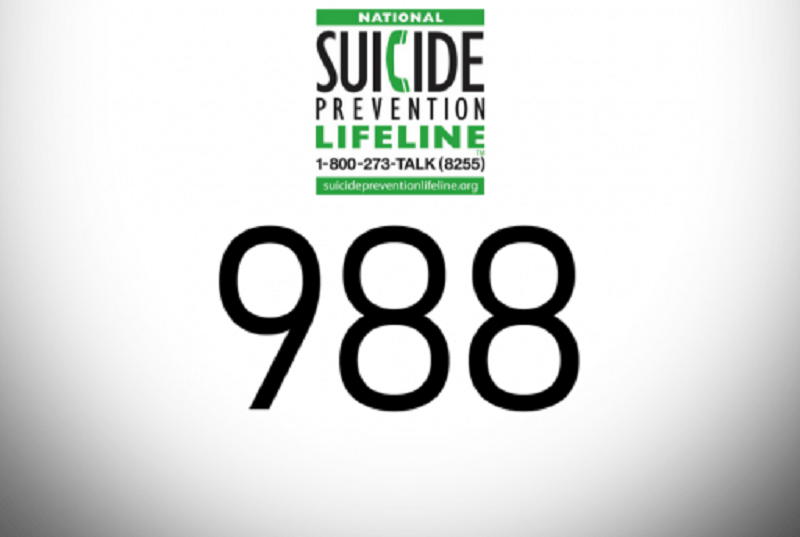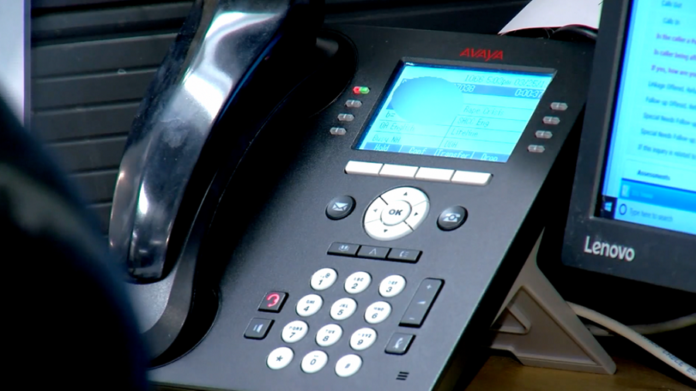(Updated to reflect House Appropriations committee action on Tuesday)
A little more than year from now, a new national suicide hotline will start transforming the way the public seeks help for mental health emergencies.
By next July, a new hotline number — 988 — will replace a 10-digit number that’s used to reach the current National Suicide Prevention Lifeline.
But Kansas is facing questions about whether it’s ready to respond to the flood of calls anticipated with the new hotline, which is expected to be as commonplace as 911 for other emergencies.
A bill imposing a monthly surcharge of 50 cents on cellphone users and landlines to pay for mental health services for hotline callers is mired in a committee in the Legislature with no sign that it will be passed before the session ends.
The proposal has been met with a cool reception from telecommunications companies, which have raised concerns about the proposed fee, especially about accountability and transparency for how the money would be spent.
Congress authorized states to impose a fee to administer the 988 hotline to ensure the “efficient and effective routing of calls.”
The law says states can impose the fee for costs “reasonably attributed” to personnel as well as mental health, crisis outreach and stabilization services.
How Kansas decides to proceed — even if it’s smaller than the proposed 50-cent surcharge — will determine the scope of services it offers to 988 callers.
“What array of services do we want?” asked Kyle Kessler, executive director of the Association of Community Health Centers of Kansas.
“Do we want just the phone number so we can kind of use it as a dispatch, or do we want to do additional triage and referrals to available community mental health treatment services?” he said.
Republican state Rep. Brenda Landwehr recently blamed the telecommunication companies for the bill stalling in the Legislature. She said the bill was in “limbo.”
Two companies lodged concerns about the bill: T-Mobile and Verizon.
T-Mobile said it was committed to supporting a Kansas 988 program, “just as we supported the federal legislation authorizing states to establish state-specific 988 programs.”
“We are actively engaging with interested stakeholders to improve the existing bill prior to the return of the Legislature in May,” the company said in a statement.
Verizon referred questions to a telecommunications trade organization without addressing a specific email it sent to lawmakers asking the legislation be delayed.
AT&T said flatly it supported a bill that would help fund 988.
“We support sound statewide legislation that will assist with funding the implementation of 988 as the suicide prevention and mental health crisis hotline in the state of Kansas,” said Molly Kocour Boyle, president of external affairs for AT&T Kansas.
Landwehr, chair of the House health committee, said the services for 988 either needed funding through a fee spread across Kansas or a state appropriation.

“One way or the other, we have to fund these services,” Landwehr said. “It’s not an option.”
Mental health advocates say the funding is critical for providing services to the Kansans in dire need of help who will use the new hotline.
They say that without the funding to supplement the new hotline, calls could roll over to counselors in other states who aren’t as familiar with the mental health services available in Kansas and are limited in the help they can provide.
As revolutionary as the new 988 hotline promises to be in saving lives, it could be shortchanged without the bill providing state funding, mental health advocates say.
“This is a piece of legislation that is going to save lives,” said Jeff Cardwell of Olathe, who lost his son to suicide nine years ago.
“If we miss the opportunity to start this thing off right, we’re going to be behind the eight ball trying to figure out what to do next.”
The state is already having trouble responding to calls to the national hotline, and it could worsen once the new 988 line starts without more resources, mental health advocates said.
Data from the first quarter of 2020 shows that the state was answering six out of 10 calls, meaning the rest would bump over to call centers in other states.
By the end of the last quarter of 2020, the state was fielding about seven out of 10 calls to the hotline, the data shows.
The state has improved its call-answering as a result of a $90,000 grant in fiscal year 2020 that allowed for software upgrades as well as the hiring and training of more staff.
The number of calls have only been increasing in recent years and are expected to explode when 988 starts.
Kansas handled about 16,200 calls for help in 2019, an increase from about 10,800, or 50%, in 2015.
State officials estimated the number of calls in Kansas could reach between 60,000 to 120,000 in the first year of 988 if the national projections are on target.
Without additional funding, the state is at risk of sending even more calls out of state to an overwhelmed national hotline where someone in need of help might wait on hold alone with thoughts of suicide.
“We think that’s really deadly, not being able to talk to folks,” said Monica Kurz, vice president for external programming for Kansas Suicide Prevention HQ in Lawrence.
The Kansas Department for Aging and Disability Services believes the crisis centers will need significant technical assistance and additional funding to be able to meet the increase in call volume anticipated with 988.
There are now two Kansas call centers, one in Lawrence and one in Sedgwick County, with a third about to go online in Johnson County.
Andy Brown, commissioner of the Behavioral Health Services Commission for KDADS, said the agency believes it will take at least six months to prepare centers to achieve a 90% in-state answer rate for 988 calls in Kansas.
“We support a timeline that doesn’t wait for 988 to go live nationwide before we begin building the infrastructure needed to respond to Kansans in crisis,” Brown told lawmakers in written testimony.
Kessler cautioned that waiting on the funding until next year would put the state in a position of rushing to get the programs in place for 988 before it starts in July.
“Without doing something this year, we put ourselves at a disadvantage in having to do it in a very hurried-up manner next year,” he said.
The issue is seen as paramount in Kansas, which has been struggling with suicides during the last 20 years.
The state’s suicide rate increased about 70%, from 11.3 per 100,000 people in 1999 to 19.2 per 100,000 in 2018.
The 2018 suicide rate in Kansas was the highest in the last 20 years and exceeded the
national rate of 14.2 per 100,000 people.
The proposed 50-cent surcharge would generate about $17.4 million in new revenue each year, including $5.5 million for mobile crisis response teams made up of behavioral health professionals who would respond to Kansans in need.
It also would include $4 million for crisis stabilization services that would provide emergency psychiatric care to individuals who must currently go to local emergency rooms for help.
About $2.8 million would cover the cost of a bill requiring the state to establish and implement a mobile crisis services program for individuals with intellectual or developmental disabilities.
Another $3 million would go to Kansas call centers for staffing the suicide-prevention hotline 24 hours a day, seven days a week.
About $1 million would go for a statewide media campaign to promote the use of 988.
The state has developed a plan that would refine the list of services that would be offered depending on whether the cellphone charge was 50 cents, 45 cents, 40 cents or 35 cents.
With the bill stalled, Landwehr got the House Appropriations Committee on Tuesday to agree to put $7 million into the state budget for 988 services, far less than what would have been generated by the 50 cent tax on phones.
The money proposed by the House would put $1.5 million into call center staffing, $3 million for mobile crisis response teams and $2 million for crisis stabilization services.
Landwehr said the $7 million only allows the state to start providing services next year but lawmakers will still need to revist the phone tax for funding into the future.
“We need to build the infrastructure now, not later,” she said. “We have got to have this up and ready by July.”

Democratic state Rep. Barbara Ballard of Lawrence said the state should have already been prepared to offer services related to 988.
“We have known for almost two year about 988,” Ballard said. “It’s getting here quickly and we haven’t done anything about it.”
Republican state Rep. Sean Tarwater of Overland Park challenged the spending.
“I realize that mental health is a big deal and suicide prevention is a need,” Tarwater said.
“I think we’re starting a whole new program and this is just the tip of the ice berg,” he said. “Where does it end?”
Other states are moving ahead with legislation imposing a tax on phone lines for 988 services.
A bill introduced in neighboring Colorado would allow the state’s Public Utilities Commission to impose up to a 50 cent surcharge to pay for similar services related to the 988 hotline.
Colorado is expected to see a 107% increase in calls for the 988 number in FY 2022-23, for a total of 502,933 calls.
The bill would generate about $8.5 million in fiscal years 2021-22 and $10.7 million in 2022-23.
Last month, Virginia’s governor signed into law a bill that creates a 12-cent monthly surcharge on post-paid wireless charges and an 8-cent surcharge on prepaid wireless charges.
The bill calls for the state to provide crisis intervention services and crisis care coordination to anyone accessing the hotline in Virginia.
Last week, the Washington Legislature approved a 24 cents a month tax on cellphone users for 988 services starting this October. It increases to 40 cents in 2023.
The new Washington law will require the state’s Department of Health and the Health Care Authority to create crisis call center hubs, as well as an enhanced crisis response system, to implement the 988 crisis hotline.
CTIA, the trade organization that represents the telecommunication companies, said in written testimony that it doesn’t oppose the fee for 988 services in Kansas.
However, it “wants to ensure the fee is kept within reason and justified by data.”
T-Mobile and Verizon both sent emails to Kansas lawmakers last month calling for the Legislature to ensure transparency and accountability for how the money from the 50-cent surcharge would be spent.
T-Mobile told lawmakers it wants a clear understanding of what the funds are being used for in Kansas and wants the surcharge listed as one item on a customer’s bill as the “988/911 fee.”
The bill “must be amended in order to provide the necessary transparency and accountability regarding the funding that will be generated by the 988 fee,” wrote Patrick Fucik, T-Mobile’s director of state government affairs.
Verizon, meanwhile, called for the Legislature to study the issue between now and next year before moving ahead with the legislation.
Verizon said it was uncertain how high a 988 fee should be without a more extensive funding analysis, complaining it wasn’t invited to participate in the discussions about how the 50-cent proposal was calculated.
The company said the bill raised concerns about whether it was the state that would fund services outside the scope of federal guidelines.
“Congress made clear that states can only collect fees that would be restricted to crisis centers and service provider expenses,” lobbyist Dina Fisk wrote.
Fisk said those expenses should include purchasing equipment and communications services for 988 call-taking and dispatching.
Verizon expressed concern that some of the proceeds from the 50-cent surcharge could fund a separate bill requiring the state to implement mobile crisis services for Kansans with intellectual or development disabilities.
She also said the expenses should be limited to direct costs for crisis hotline center personnel and for 988 training.
Landwehr disagrees with that assessment, saying she believes the federal law is broad enough to allow for the spending that is proposed for Kansas.
“I think they’re wrong,” she said. “That federal language talks about services. They just don’t want to pay it.”
Landwehr noted that telecommunications companies supported a 37-cent increase in 911 fees during the 2019 legislative session.
For his part, Cardwell thinks 50 cents a month is a pittance to pay for saving a life.
“To have that 988 number coming down the pipeline, this is our opportunity really to have a major impact on people who are struggling,” Cardwell said.
“We as a community really need to prepare for that,” he said.
“This 50-cent-a-month tag on people’s cellphone bills is going to really help fund these folks to be able to handle the call volume,” he said.
“If you want to have an impact, you’ve got to be willing to go to the pocketbook to make things happen,” he said. “Things cost money.”














